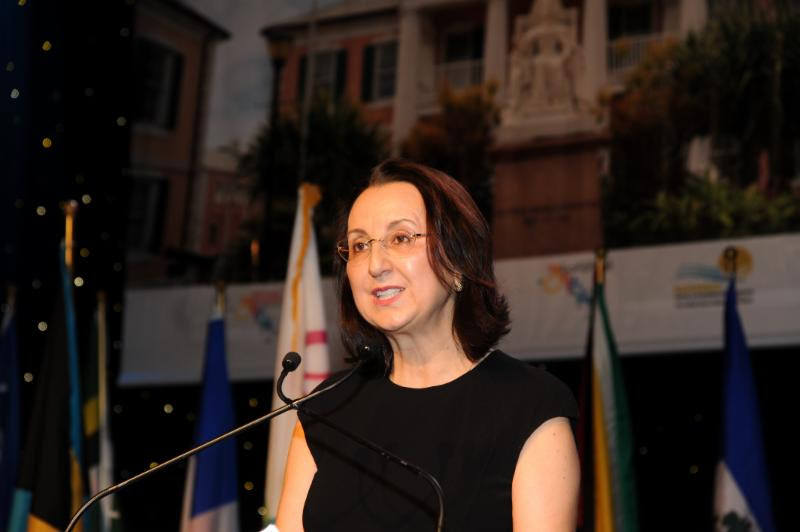US Virgin Islands Hotel & Tourism Association
CHTA June-August 2017 Update
CHTA recently distributed its June through August 2017 Update. Click here to read important information about what CHTA is doing for the region and its members.
 CHTA Education Foundation Awards More than $130,000 in Scholarships this Year
CHTA Education Foundation Awards More than $130,000 in Scholarships this Year
The Caribbean Hotel and Tourism Association Education Foundation is awarding more than $130,000 worth of scholarships to nearly three dozen Caribbean students this year.
Including the renewal of 12 scholarships awarded to students last year, this academic year will record a total of 34 scholarships funded by the nonprofit group. Seventy people applied this year and scholarships range, on average, from $2,000 to $5,000 and are exclusively for tuition costs. Universities such as Johnson & Wales provide matching grants for CHTAEF recipients, effectively doubling the scholarship awards.
The association set up the foundation 30 years ago to support programs for the development and improvement of education and training in the tourism and hotel sector in the Caribbean. Scholarships are available to Caribbean students and industry professionals pursuing higher education or professional development in the hospitality and tourism field and are awarded with support from CHTAEF sponsors and supporters.
CHTAEF Chairman Richard Kahn thanked the numerous hotels and resorts for their support of the foundation, but highlighted corporate partners Interval International and Virgin Holidays for their generous funding of Caribbean education.
“The hotel stays we receive from our CHTA members provide the value we use for The New York Times Travel Show Auction, which this year produced more than $106,000 in revenue for the foundation,” he said, adding, “we couldn’t provide these scholarships without those funds.”
“Seeing these scholarships awarded to our talented Caribbean nationals is one of my most pleasurable duties,” enthused Karolin Troubetzkoy, CHTA President, who thanked national hotel and tourism associations across the region for their support throughout the process. “There is no better investment we can make than banking on our splendid young people and industry professionals who will transform our sector with their dynamism, enthusiasm and intellectual rigor.”
2017 winners include Cenita Liddie from Anguilla; Kia Harrigan from Antigua; Aruba’s Marc Anthony Ranis; and Forjee Jackson, Gabrielle Josey, Donovan Moss, Dwayne Sinclair, Antanae Taylor and Kenria Taylor from the Bahamas. Additional scholars are Roberta Alleyne, Makayla Bennett and Christine Gibson from Barbados; Kendra Gajadhar from Guyana; Jamaica’s Dominique Haughton and Brianna Jureidini; and St. Lucians Carleen Isidore, Stacy Lamontagne, Astrid Lindberg and Geni St. Paul. St. Maarten’s Nathalie Boston, Trinidad and Tobago’s Duncan Dwayne, and Jecoix Gittens of the U.S. Virgin Islands were also in winners’ row.
CHTA Joins Forces with Travel Associations Worldwide to Unify Sector
 The Caribbean Hotel and Tourism Association is partnering with travel associations around the world to strengthen the tourism sector in the region.
The Caribbean Hotel and Tourism Association is partnering with travel associations around the world to strengthen the tourism sector in the region.
CHTA President Karolin Troubetzkoy disclosed that under the stewardship of the World Travel and Tourism Council, CHTA has joined forces with close to a dozen regional and national travel organizations to advocate for the sector among governments, legislators and economists.
The National Travel Association Coalition, which comprises travel associations from Australia, Canada, the Caribbean, Egypt, Europe, Japan, New Zealand, South Africa, the United Kingdom and the United States, provides a forum for national travel associations to support each other and ensure the sustainable growth of travel and tourism. CHTA and its regional public sector partner, the Caribbean Tourism Organization, are both founding members of NTAC.
“We have also agreed to leverage NTAC to amplify the voice of the travel and tourism industry, and emphasize the sector’s significant role as a major force for economic development, employment and sustainability to ensure it is considered more seriously at the policy table,” said Troubetzkoy, executive director of the award-winning Anse Chastanet and Jade Mountain resorts in St. Lucia.
Highlighting the importance of working together, she said there was much to gain by sharing best practices, including how advocacy for travel and tourism is enacted across the globe, particularly during election season.
The CHTA president said the coalition is considering centralized funding and collaboration on similar projects to improve cost efficiency, as well as the benefit of jointly seeking other sources of support.
“As we continue to build this resourceful network of associations, we can also support each other on common issues and share relevant reports and global perspectives on innovation disruptive models such as the sharing economy,” she asserted.
Tourism is one of the world’s largest economic sectors, contributing more than 10 percent to global Gross Domestic Product. The industry now supports one in 10 jobs on the planet, according to WTTC. Its impact on the Caribbean is even greater.
Members of the NTAC include ABTA – The Travel Association (United Kingdom), the Caribbean Hotel and Tourism Association, the Caribbean Tourism Organization, the Egyptian Tourism Federation, the European Travel Commission, the Japan Travel and Tourism Association, the Tourism Business Council of South Africa, Tourism and Transport Forum Australia, Tourism Industry Aotearoa (New Zealand), the Tourism Industry Association of Canada and the U.S. Travel Association.
Culture Clash: Is Your Company Culture Holding You Back?
The development and proliferation of OTAs, the sharing economy, social media and other technology driven innovations have forever changed the hospitality and tourism industry. Guests’ purchasing patterns and expectations are now more than ever digitally driven. Only businesses with a culture fueled by innovation and collaboration will leverage technology effectively to its advantage, instead of being paralyzed by it. Click here to read more.
Caribbean Tourism Progress Hinges on Smarter Partnerships
The Caribbean Hotel and Tourism Association applauds efforts being made by the region’s public and private sectors to grow tourism, but cautions against the inherent risks if the sectors do not work more closely together to resolve differences.
With regional and global investor confidence critical to the Caribbean’s tourism future, the organization called for more effective collaboration and pointed to tourism’s immense contribution to employment, entrepreneurial activity, tax revenues and to its untapped potential to grow and develop to the benefit of the Caribbean’s people, governments and the industry.
 The Caribbean is the most tourism-dependent region in the world and CHTA maintains that tourism’s contribution to the region’s economies cannot be understated, generating more than 80 percent of GDP in some jurisdictions. Travel and tourism is already one of the world’s largest economic sectors, supporting 292 million jobs, and is projected to become the largest in the next several years.
The Caribbean is the most tourism-dependent region in the world and CHTA maintains that tourism’s contribution to the region’s economies cannot be understated, generating more than 80 percent of GDP in some jurisdictions. Travel and tourism is already one of the world’s largest economic sectors, supporting 292 million jobs, and is projected to become the largest in the next several years.
Frank Comito, director general and CEO of CHTA, asserts that a healthy investment climate and investor confidence are linked directly to good governance and sound business practice.
“Any discourse which casts aspersions on the motives of government or maligns our tourism industry players and their significant contributions to socio-economic development cannot be good for our region,” he said.
“In today’s era of risk aversion for financing by banks and other investors, it is essential that we continue to advance an open and transparent investor-friendly environment. While we may tend to think of ourselves as individual companies or countries, many investors look at the Caribbean as one, so what happens in one destination, positive or negative, can reflect on the entire Caribbean,” Comito added.
Comito, the former executive vice president of the Bahamas Hotel and Tourism Association, said there has been greater movement in recent years towards stronger public-private sector collaboration and a civil discourse, through CHTA’s work with the Caribbean Tourism Organization and CARICOM Heads of Government, as both organizations work to mount a regional tourism development and marketing initiative.
“We are also seeing more progress at the destination level – albeit not to the level it needs to be at yet,” he said.
CHTA recognizes the committed and hardworking public sector officials who are devoted to ensuring Caribbean countries and territories continue to generate revenues to maintain systems that keep communities running. The association also observes greater resolve by civic, business and government leaders to create a more positive investment climate, eliminating the corruption, bureaucratic torpor and inefficiencies stifling development in other regions.
The common ground between the public and private sectors is far greater than points of difference, CHTA asserts, and the Caribbean should focus on what can be done together for the greater good while addressing differences in a manner that engenders confidence and trust.
Expressing concerns about those situations where the public and private sectors don’t see eye-to-eye, Comito was confident that all parties, today and in the future, will rise above their differences to work together towards what’s best all around.
He asserted that collaboration was beneficial not only to the thousands of people directly benefiting from tourism, but also to the investors who have risked their resources and placed their confidence in the stability and predictability of investing in the region.
“Our region has come a long way and we should remember these achievements as we move towards honorable conclusions to unfortunate misunderstandings,” he said.
